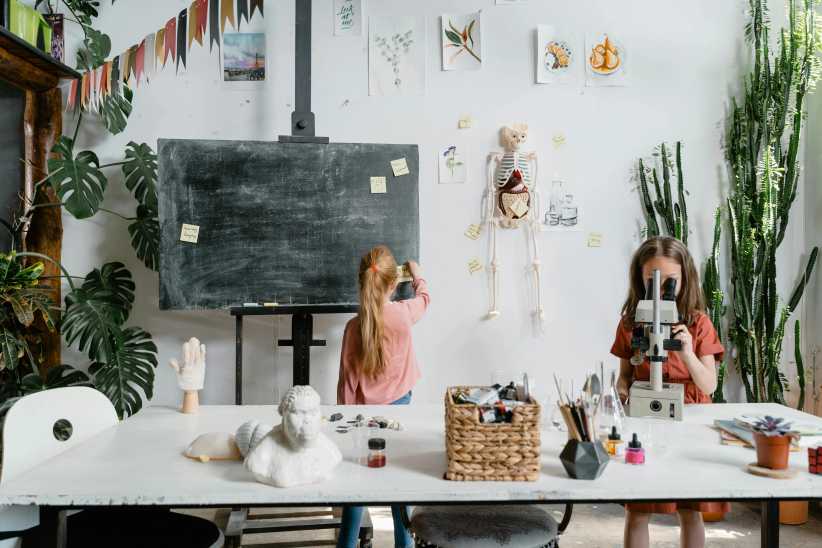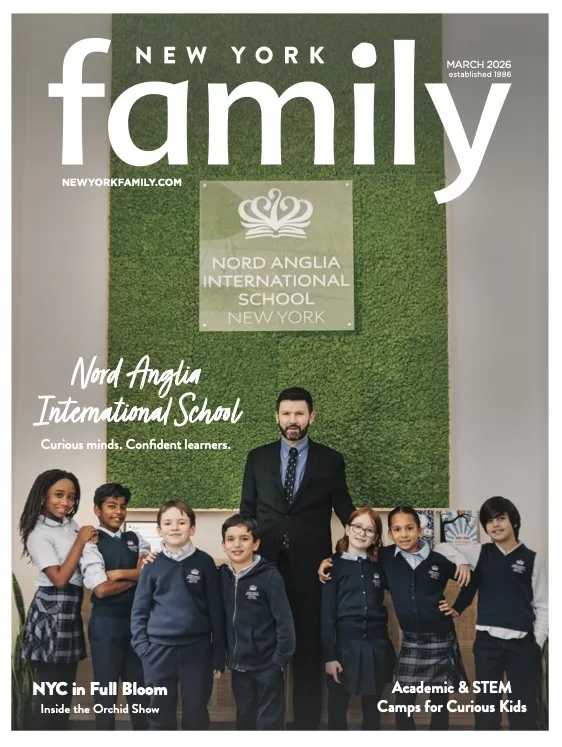
As a veteran ballet dancer, I’m used to walking into any dance studio and seeing two things: a wood floor and an expansive floor-to-ceiling mirror. To my surprise, when I visited a class of students ages 7 and 8 at New York Theatre Ballet’s school, the requisite mirror was hidden behind a great black sheet.
Diana Byer—Founder, President, and Artistic Director—smiles at my confusion. Laughingly, she points out that ballet dancers are always looking at themselves, but she wants her students to focus on the dancing itself. “Dancers need to feel the movement within the body, and the mirror is only used to correct specific faults,” she tells me. Then it truly struck me: This place really does know children and how to introduce them to the joy of dance.
What the covered mirror offers is a reflection into what a unique enterprise New York Theatre Ballet (NYTB) is for kids. Part company and part school, it’s the only professional group across the country devoted to producing a full season of performances specifically for children alongside shows for adults. Amidst revivals of master choreographers and new works by up-and-comers, hour-long ballets with child-minded themes capture the attention of youth and adults alike. To truly help kids engage in the performance, Diana leads an interactive introduction and lesson before each show, discussing topics like lighting, strike tape, and beats before letting the audience try it out for themselves.
“The full season introduces [children] to dance with ballets of high quality, and the choreography is sophisticated enough for parents to enjoy as well,” says Sarah Frank, the Chair of Dance Ring, the board of NYTB.
Diana had moved to the city to study at Juilliard at the age of 17, but it wasn’t until 1978 that she founded the company. She had been dancing with Les Grandes Ballets Canadiens, based in Montreal, and upon return to NYC reconnected with fellow dancers with whom she’d studied under Cecchetti protégé Margaret Craske. When different members of the group wanted to choreograph separate pieces using the same dancers, Diana suggested that each design one ballet, which she’d coordinate into a comprehensive program. Once the program was up and running, Diana said that she would continue to act as an artistic director for the next three months. Three months became 33 years.
New York Theatre Ballet’s signature one-hour family series was the brainchild of Kermit Love, the creator of Big Bird who was on the company’s original board of directors, and Jim Henson, also of “Sesame Street” fame. In 1981, NYTB introduced its first hour-long adaptation of “The Nutcracker,” choreographed by Keith Michael, the dance production coordinator at The Juilliard School. Since, they’ve also produced highly popular condensed classics like “Cinderella” and “The Alice-in-Wonderland Follies.”
Today, NYTB has 12 full-time dancers and a worldwide reputation for excellence and creativity. In the city, the company most frequently performs at Florence Gould Hall, an intimate theater that seats 400 and allows audiences to see the dancers more closely than they would at a typical ballet. For two to four months a year, the company tours the world, including smaller cities less frequented by other ballet companies. Its shows are a wonderful way for children and adults to enjoy numerous forms of art, not just dance. As Diana says, “It’s [also] about costumes, art, literature, storytelling, and design.”

That same philosophy is apparent at Ballet School NY (BSNY) blocks away from Madison Square Park, set up in the same year as NYTB’s inception as the official training school of the company. Pre-ballet classes start at 3, while the Young Arts Division prepares children 12-16 for careers in dance and a summer intensive introduces them to other aspects of ballet like swatching fabrics for costume design.
To make the ballet performances accessible for all, NYTB set its top ticket price at $41—a steal by Manhattan standards. The school also offers a series of very affordable $15 studio shows, known as Dance on a Shoestring, in which new choreographers and students experiment with dance in front of a live audience. Sarah explains that this makes the work of the company “that much more challenging and promising, because we [still] need beautiful sets, productions, and complicated costumes.”
In the spirit of spreading a love of dance, NYTB also runs The LIFT Study Program, which provides dance scholarships to children from lower income households and homeless shelters. The program began twenty years ago, after the Department of Cultural Affairs chose NYTB to participate in a week-long camp for children in the shelters, including breakfast, hour-long ballet lessons, and reading and vocabulary classes.
The school, company, and scholarship program come from a love of ballet that imbues the community of dancers and supporters. I could feel the tangible excitement humming in the halls of the school on a late November morning; many parents crowded outside the studio to help package promotional materials for the newest show while their children danced away in class.
NYC mom Susan Lin, whose son and daughter began taking classes at Ballet School NY when they were 6 and 2.5 respectively, attests to the caring and intimate environment that Diana and her colleagues create. “My son once described BSNY as a place where he could forget all of his worries—he loves it,” she says. “The NYTB professionals are wonderful with the kids. They’re like the cool, much older siblings whom the students respect and admire.”
The offerings of the upcoming season are right on pointe for family fun. All ages can enjoy “Bark! in the Park,” the newest piece by Chase Brock—the man behind the Spider-Man musical—about two children who lose their dog in Central Park. The younger set will also appreciate “Goose!” featuring beloved nursery rhyme characters. And fans of the classics can’t miss the one-hour rendition of “Sleeping Beauty,” part of the Once Upon a Ballet series that brings storybook tales to the stage.













